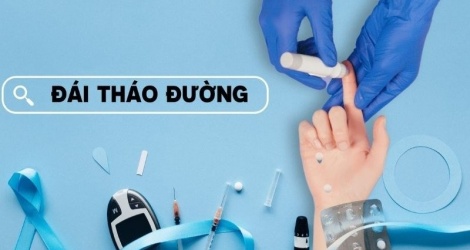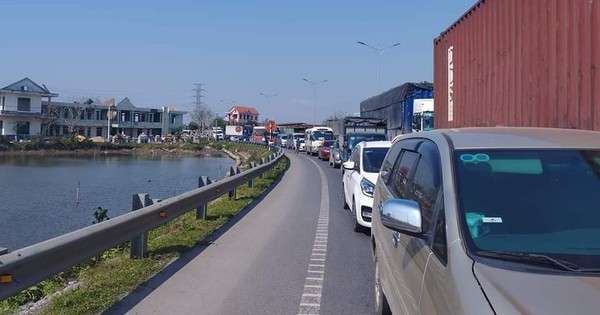Recently, Thu Duc City Hospital (HCMC) promptly provided emergency care to a 49-year-old man with a blood clot blocking the artery to the upper coronary artery, with a history of high blood pressure and smoking.
Sudden onset
The patient was admitted to the hospital with severe pain in the epigastric region. Through examination, doctors determined that Mr. S. had an acute myocardial infarction in the inferior wall, the right coronary artery was blocked by a large blood clot with severe atherosclerosis. Doctors performed aspiration of the blood clot in the coronary artery, then placed a stent to restore the coronary artery to its original state, and restore blood flow.
Master-Doctor Dao Quang Hoang, Deputy Head of the Cardiology Department of Thu Duc City Hospital, said that the cause of the disease is due to unstable atherosclerotic plaques activating the blood clotting system, causing blood clots to partially or completely block the coronary arteries, causing the heart muscle in the area controlled by the blood vessels to be deprived of blood supply. "Myocardial infarction is a very dangerous disease, affecting the health and even the life of the patient. This is an emergency condition, the patient can die if not treated promptly. Up to 10% of myocardial infarction cases lead to sudden death" - Doctor Hoang warned.

A case of myocardial infarction was just saved by Thu Duc City Hospital
Previously, the University of Medicine and Pharmacy Hospital in Ho Chi Minh City also saved Mr. HMN (35 years old, living in Ho Chi Minh City) who was admitted to the hospital with chest pain, shortness of breath, and sweating. After performing an electrocardiogram and cardiac enzymes, the doctors diagnosed him with an acute myocardial infarction, and the coronary angiography showed a large branch was blocked. After a coronary artery stent was placed, the patient's health recovered well.
Mr. N. has no history of cardiovascular disease but is being treated for type 2 diabetes. For the past 3 months, he has been under constant stress at work, has had little exercise, and has been eating irregularly. Occasionally, he feels heavy chest pain and difficulty breathing, but he subjectively does not go to the doctor and does not think he might have a heart attack.
According to doctors, myocardial infarction is mostly caused by atherosclerosis of the arteries that feed the heart, in addition to some other causes such as: coronary artery spasm, heart trauma, cardiomyopathy due to stress. Previously, the disease was common in people over 60 years old, but now, many cases of emergency hospitalization due to myocardial infarction are very young, only over 30.
Risks from lifestyle
According to experts, risk factors for myocardial infarction include: smoking, high blood pressure, diabetes, hyperlipidemia, family history of cardiovascular disease. Some other factors also increase the risk of myocardial infarction such as male gender, elderly people, overweight, obesity, sedentary lifestyle... In young people, unhealthy lifestyle, work pressure, and subjectivity in controlling risk factors also increase the risk of myocardial infarction.
Master-Doctor Vu Hoang Vu, Head of the Cardiovascular Intervention Department at the University of Medicine and Pharmacy Hospital in Ho Chi Minh City, said that the most typical symptom of a heart attack is severe chest pain: pain in the middle of the chest, behind the sternum or slightly to the left, a feeling of heaviness, suffocation, tightening, pressure, sometimes spreading to the left arm, up to the chin and down to the abdomen above the navel. Chest pain usually lasts about 20-30 minutes or longer. The patient may also sweat, have difficulty breathing and faint. Some patients do not have chest pain but have abdominal pain above the navel or back pain.
The signs and symptoms of a heart attack can vary depending on age, gender, the area of the blood vessel affected, and other medical conditions. The rate of recurrent heart attacks ranges from 10% to 14%, especially in people with multiple risk factors, older people with multiple medical conditions, and people who have had a heart attack but stopped taking medication or did not comply with treatment.
Master-Doctor Tran Nguyen An Huy, Head of the Department of Internal Medicine and Interventional Cardiology at Hoan My Saigon Hospital, recommends that patients with underlying cardiovascular diseases need to be monitored and have their health problems well controlled. If they have signs of pain as mentioned above, they must go to the doctor immediately. People with myocardial infarction need to have their blood vessels to the heart restored as soon as possible to limit damage and necrosis of heart muscle cells.
"The golden time is the first 48 hours, especially the first 12 hours. As soon as there are signs of pain as above, the patient needs to quickly go to a medical facility with a cardiology specialist for timely diagnosis and intervention" - Dr. Huy recommends.
According to Master-Doctor Ngo Vo Ngoc Huong, Department of General Cardiology, People's Hospital 115, the hospital receives many cases of the disease when they are under 30 years old. "Having cardiovascular disease in young and energetic subjects is an alarm bell. Building a healthy lifestyle with a reasonable diet; regular check-ups and periodic tests as well as not smoking and limiting alcohol are necessary for good cardiovascular health" - Doctor Huong noted.
First aid for people with myocardial infarction
Master-Doctor Huynh Thanh Kieu, Head of the Cardiology Department at Tam Anh General Hospital in Ho Chi Minh City, guides some basic principles when giving first aid to people with acute myocardial infarction: Have the patient sit or lie down, loosen the belt and clothes to help blood circulate easily, then call an ambulance. If you cannot wait for an ambulance, take the initiative to hire a taxi or take the patient to the hospital yourself.
Have the patient chew and swallow an aspirin while waiting for emergency help. Aspirin helps prevent blood clots, reducing the risk of heart damage. Do not use aspirin if the patient is allergic to it.
Chest compressions should be performed as soon as possible because for every 1 minute delay, the patient loses 10% of their chance of survival.
Source




















































Comment (0)